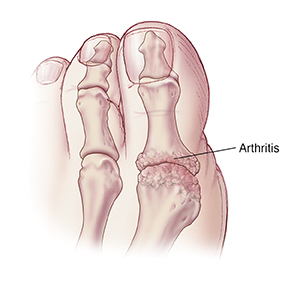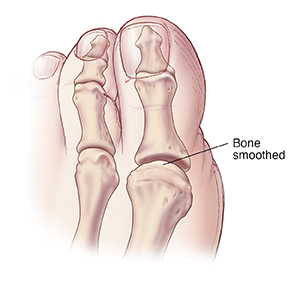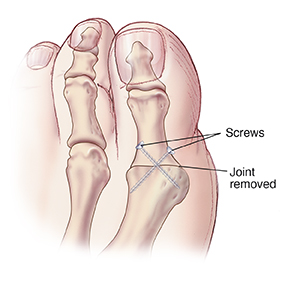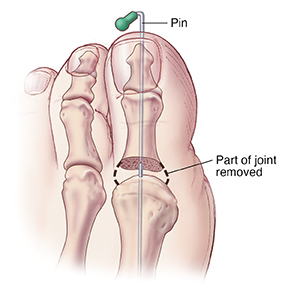Foot Surgery: Degenerative Joint Disease
Degenerative joint disease (arthritis) often happens in the joint of the big toe. In addition, bone growth may cause pain and stiffness in the joint. Left untreated, arthritis can break down the cartilage and destroy the joint. Your treatment choices depend on how damaged your joint is. There are several nonsurgical treatments. But if these are not helpful, surgery may be considered.
Cheilectomy
This is done when the arthritic joint and cartilage can be saved. A bone spur caused by arthritis may be on the top of the big toe joint. The procedure involves removing this bone spur, often with a small part of the top of the joint itself. You will need to wear a surgical shoe for a few weeks. Once the foot heals, joint movement can be restored.


Fusion
In fusion, the cartilage and some bone on both sides of the joint are removed. Then, the big toe and metatarsal bones are held together with staples, screws, or a plate and screws. Your foot may be placed in a cast, shoe, or boot. While you heal, you will be asked not to bear weight on this foot. You may also need crutches for several weeks. Because the joint has been removed, your toe will be less flexible.

Arthroplasty
During surgery, bone growth and arthritis are trimmed, and part of the joint is removed. A pin can be used to align the bones and to keep them from touching. The pin is removed after several weeks. In some cases, the entire joint or part of the joint may be replaced with an implant. You may have to wear a splint or a surgical shoe for several weeks. When healed, the bones become connected with scar tissue.

Online Medical Reviewer:
Rahul Banerjee MD
Online Medical Reviewer:
Raymond Turley Jr PA-C
Online Medical Reviewer:
Rita Sather RN
Date Last Reviewed:
4/1/2024
© 2000-2025 The StayWell Company, LLC. All rights reserved. This information is not intended as a substitute for professional medical care. Always follow your healthcare professional's instructions.